Reviewed by Glenn Erickson
Tough-guy director Robert Aldrich came up through the ranks dealing with some pretty rough situations, assistant-directing for a score of the most creative directors in Hollywood. He took the director's chair for first time simply because an MGM producer thought he had the experience and could do a great job. Half of the talents Aldrich had worked for had been blacklisted, but the movies he initiated were dramas of radical-moral outrage with violence built into their titles: Kiss Me Deadly, and "attack". His The Big Knifeis a virulent attack on Hollywood's mogul-driven studio system. In the middle of a three-picture deal with Aldrich, Columbia's studio chief Harry Cohn realized that the evil mogul in The Big Knife had been based on him, personally. The way the Hollywood power game played, it was only natural that Aldrich's trust-challenged "across the room" relationship with Cohn would deteriorate. Aldrich was removed from his second Columbia film and his third was cancelled; he had to sit idle for a year until the Columbia contract expired. Not the type to remain silent, Aldrich took Cohn to court and aired their differences in the trade papers. It wasn't a question of being blackballed or blacklisted, but a year later Aldrich was a voluntary exile working in Europe.
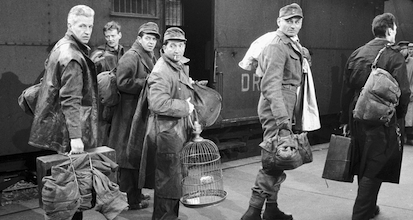
Ten Seconds to Hell began as The Phoenix a project in a deal between United Artists, Seven Arts and Michael Carreras of London's Hammer Films. Most of the crew filming in West Berlin was British but Aldrich was able to bring along his cameraman Ernest Laszlo. The story idea is a gritty conflict between men in a literally explosive, profession: the disarming of unexploded bombs dropped on German cities by massed Allied raids. So many thousands of live bombs were left in the rubble of European cities that they're still being found over half a century later. Tough men doing a dirty job has always been a Robert Aldrich forte: his best work in this line is probably the great The Flight of the Phoenix. 1
The story is about hard men doing a suicidal job. Arriving in Berlin immediately after the surrender are six German bomb disposal experts, who were forced to learn that specialty as a punishment for military infractions or political dissent. They range from mouthy kid Hans Globke (Jimmy Goodwin) to forlorn Wolfgang Sulke (Wesley Addy), who lost his family in the bombing. Peter Tillig (Dave Willock) is more cheerful, and Franz Loeffler (Robert Cornthwaite) finds peace by taking care of birds. Disillusioned ex-architect
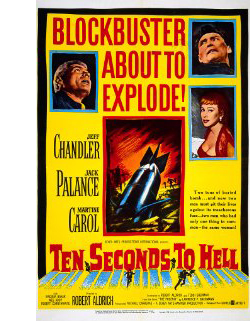 Eric Koertner (Jack Palance) is a natural leader. The group elects him as their leader, a fact that grates on Karl Wirtz (Jeff Chandler), a schemer seemingly obsessed with lowering Koertner to his own level of opportunism. British Major Haven (Richard Wattis) hires the men to defuse bombs found by the urban reconstruction crews clearing away rubble. The compensation is double pay and double rations, a big inducement considering that most German citizens are badly malnourished. The men seek out accommodations on their own. Koertner and Wirtz find companionship with Frenchwoman Margot Hofer (Martine Carol), the widow of a German. When Margot chooses Koertner, Wirtz mocks their relationship from the side, especially when drunk.
Eric Koertner (Jack Palance) is a natural leader. The group elects him as their leader, a fact that grates on Karl Wirtz (Jeff Chandler), a schemer seemingly obsessed with lowering Koertner to his own level of opportunism. British Major Haven (Richard Wattis) hires the men to defuse bombs found by the urban reconstruction crews clearing away rubble. The compensation is double pay and double rations, a big inducement considering that most German citizens are badly malnourished. The men seek out accommodations on their own. Koertner and Wirtz find companionship with Frenchwoman Margot Hofer (Martine Carol), the widow of a German. When Margot chooses Koertner, Wirtz mocks their relationship from the side, especially when drunk.
True to his nature, Karl proposes a greedy plan for the group, based on the reality that some of them are sure to be killed. Each man will put half his wages into a pot, to be divided by the survivors. Koertner recommends giving the 'bomb lottery' a life of just three months. The men take on bombs in a specific batting order. When one bomb kills an expert after being defused in the normal way, the others worry that the British bomb makers have added additional unknown ignition devices to some bombs, apparently for the express purpose of killing disposal experts. As more men die, the suicide game becomes tenser. Thinking always of survival and the $$ prize, Wirtz considers finishing the competition early, by cheating.
Ten Seconds to Hell has what's called an un-killable story, one with a built-in mechanism to keep viewers interested in the outcome. It's a good thriller with more than its share of tense scenes, but not an outstanding show on every level. Even with the injection of American money and talent, Hammer's production looks cheap. It is filmed on authentic German locations yet captures little atmosphere of the defeated capitol. Most scenes take place in hollow interior sets that could have been filmed back in England. The occupation forces are represented by one British Major in a jeep; the technology built to deal with the bombs amounts to one rig with pulleys and rope to unscrew fuses from a safe distance. Even a story focusing on ticking bombs needs a context of some sort.
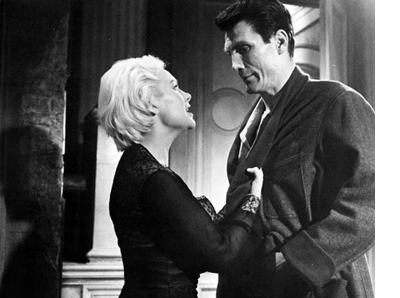
Robert Aldrich best films are almost always made in the casting. He's very good at reining in belligerent actors 2 but sometimes fails to curb scenery chewers. The Germans are all played by Americans, which hurts the film's visual backdrop of documentary realism. Jack Palance is more or less re-playing his 'decent guy' Lt. Costa from "attack". He went over the top in both that picture and The Big Knife but is nicely subdued here, and the rest of the cast follows suit. Top-billed Jeff Chandler is good but not all that compelling; the movie is about the intersection of these two personalities, but no real dramatic fireworks result.
That leaves the movie to rely on its highly suspenseful bomb scenes, the best of which are quite good. The bombs are found in piles of bricks and twisted concrete, inside blasted buildings where tons of stone might collapse at any second. The bomb experts attach a wheel-like device to the bombs to unscrew the detonators from afar, but surely not far enough away to be safe from an explosion. A couple of the scenes are terrifying. An unlucky expert is trapped when a bomb shifts and rolls over on him. Another has successfully removed a fuse, so his bomb should be inert and safe - until a sudden high-pitched whirring noise indicates that a second detonator has been tripped.
Slightly past her prime, French beauty Martine Carol is not at all memorable. She was perfect as the waxen Lola Montès remembering her bizarre life of scandals, but that movie required an enormous circus to animate her character. In this show she seems false in every scene, an effect not helped by the unflattering white hair she's been given.
Ultimately the fault comes back to Robert Aldrich, who shares writing credit on a movie that fails to build on any of its themes. The men die at random, which is in tune with the nature of the menace. But as we can guess that Wirtz and Koertner will be the last two left alive, the other experts become mostly irrelevant. Their elaborate introductions are okay, but considering the story's existential void, the film's All Quiet on the Western Front- like curtain farewells ring hollow.
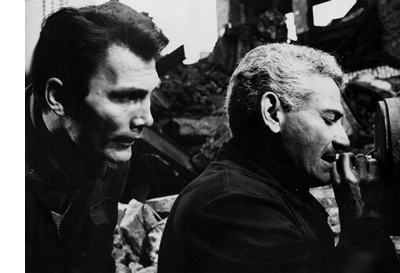
The screenplay has a lot of talk but accomplishes little in the drama department. A few scenes suggest that Eric Koertner is going to be presented as the "hope of Germany", but he doesn't seem very interested in the job. Koertner has designed at least one building of consequence, so viewers may wonder why he's risking being blown up every day instead of working as an architect. They aren't told that it took years for the rebuilding of Germany to kick into high gear. Are there other political considerations we don't know about? When not in the dirt with the bombs, the movie stumbles around with a romantic story that doesn't come together.
Most troubling of all is that Ten Seconds to Hell doesn't get deep enough into the mechanics of the disposal group's deal with the Devil. It's as if the men all shared beneficiary status on their six insurance policies... a situation that sounds like an inducement to let the other guy die, not help each other stay alive. It's voluntary work; they don't have to do it. It's also solitary work, with each man on his own during the crucial defusing. The movie might have made a statement about how men work together in a difficult job environment, as does Flight of the Phoenix.
In both The Small Back Room and the later Juggernaut, the man in the hot seat is in telephone communication with his peers, reporting exactly what he's doing with his bomb so that "the next man" won't fall victim to the same mistake. Is it possible that these guys don't have access to the necessary equipment? It's also established that the experts are not being given a full accounting of exactly how the bombs are put together, even though they're working for the people who made them. I would imagine that in real life the typical red tape SNAFUs would apply: men die unnecessarily because nobody will bother to de-classify the information. What? Give our bomb secrets away to some Germans? You must be mad.
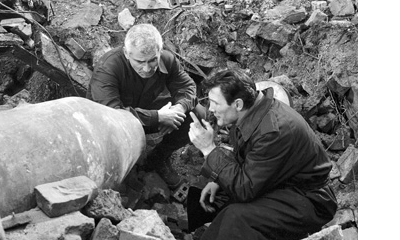
Even if Aldrich wanted to, he probably couldn't raise questions about the lack of cooperation between former enemies and former allies amid the political mess of Berlin after the victory. Ten Seconds to Hell drops that angle too. About the only thing remaining is the idea that the defusers would naturally be men already trained for such work. The Germans put men in those jobs as a punishment, a fact confirmed in the later German movie Stalingrad. Perhaps Wirtz went AWOL, or Koertner declined Nazi party membership in too public a manner. With the exception of Wirtz, all the men we see are nice guys, and not ideological dissidents or malcontents. Aldrich was to do a lot more with the absurd good soldier / bad soldier equation in his later escapist war epic The Dirty Dozen.
Ten Seconds to Hell had a rough post-production period that delayed its release by a year. Aldrich's 131-minute cut was shortened by almost a third, which means that it could have been much different -- or just interminably slower. What if the dramatic scenes we're left with are the 'good stuff?" The Aldrich experts 3 have never mentioned any politically inconvenient or otherwise censorable content in any of the cut material. The only clue I detect is in the film's advertising billing block: actress Virginia Baker receives forth position just behind the main actors. Did the Hammer/Seven Arts editor remove subplots about the other four bomb experts? Did Wesley Addy's character originally have a relationship with Virginia Baker's Frau Bauer, the clerk and secretary assigned to the bomb disposal group?
Ten Seconds to Hell reportedly under-performed for United Artists, but I remember it being a hot discussion title on the grammar school playground when it hit TV in the early 1960s. During his exile from studio work, Robert Aldrich racked up a short list of oddball movies. None was a hit, although the screwy Biblical epic Sodom and Gomorrah is certainly diverting. He'd smash back to the top of the business with 1962's What Ever Happened to Baby Jane? and in 1968 would boldly open a mini-studio of his own.

The KL Studio Classics Blu-ray of Ten Seconds to Hell is a beautiful new transfer properly formatted in widescreen. For the record, the newest transfers of MGM titles use a new animated, zooming, shiny Leo Logo. The widescreen framing is native, not enlarged from flat elements. A newly created fine grain scan element was made from the original negative. It includes the original old-fashioned United Artists logo.
MGM's film curators Deluxe Digital conducted a search for a possible longer cut, but nothing turned up in either America or in England with Hammer. Robert Aldrich's long cut likely got no farther than the work print stage.

The film's original trailer is also beautifully transferred in widescreen; it uses a ticking clock and fast cutting to set up the basic situation. Ten Seconds to Hell is another Robert Aldrich film with a title and theme that reference some kind of apocalypse. Death symbolism also figures heavily in the glossy foreign artwork used on KL's package cover. Once shown seemingly every week on television, this little suspense gem had been relatively scarce for twenty years or so, a problem remedied by Kino's stunningly good-looking disc.
On a scale of Excellent, Good, Fair, and Poor,
Ten Seconds to Hell Blu-ray rates:
Movie: Good -
Video: Excellent
Sound: Excellent
Supplements:
Deaf and Hearing Impaired Friendly?
YES; Subtitles: English
Packaging: Keep case
Reviewed: January 6, 2014
Footnotes:
1. The best, or at least the most interesting movie about bomb disposal is Michael Powell and Emeric Pressburger's The Small Back Room, an intense drama about an unstable scientist who doubles as a bomb expert.
Return
2. Hollywood applauded Aldrich for getting Joan Crawford under control on Autumn Leaves, and for successfully refereeing a Diva War on What Ever Happened to Baby Jane? For his male-driven movies he was like a football coach -- imagine keeping all those cocky & competitive actors in The Dirty Dozen on task.
Return
3. The production details given here come mostly from Alain Silver and James Ursini's excellent book What Ever Happened to Robert Aldrich? Limelight, New York, 1995.
Return

Text © Copyright 2014 Glenn Erickson
See more exclusive reviews on the Savant Main Page.
Reviews on the Savant main site have additional credits information and are often updated and annotated with reader input and graphics.
T'was Ever Thus.
Return to Top of Page
|

